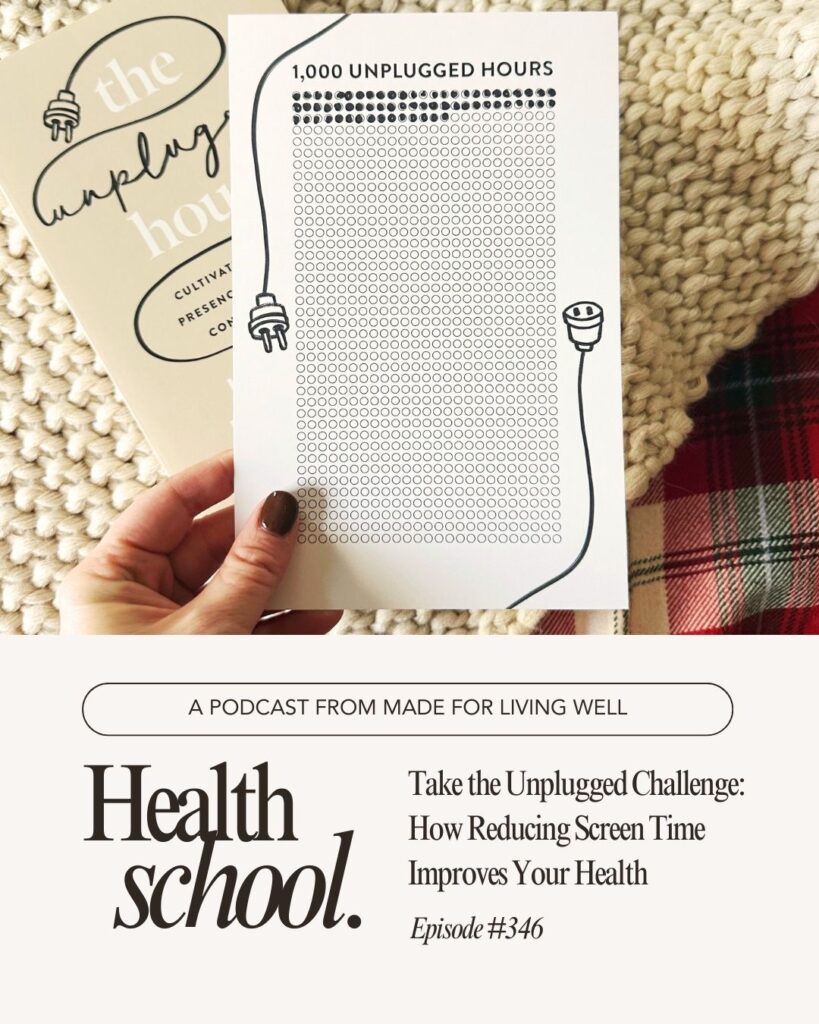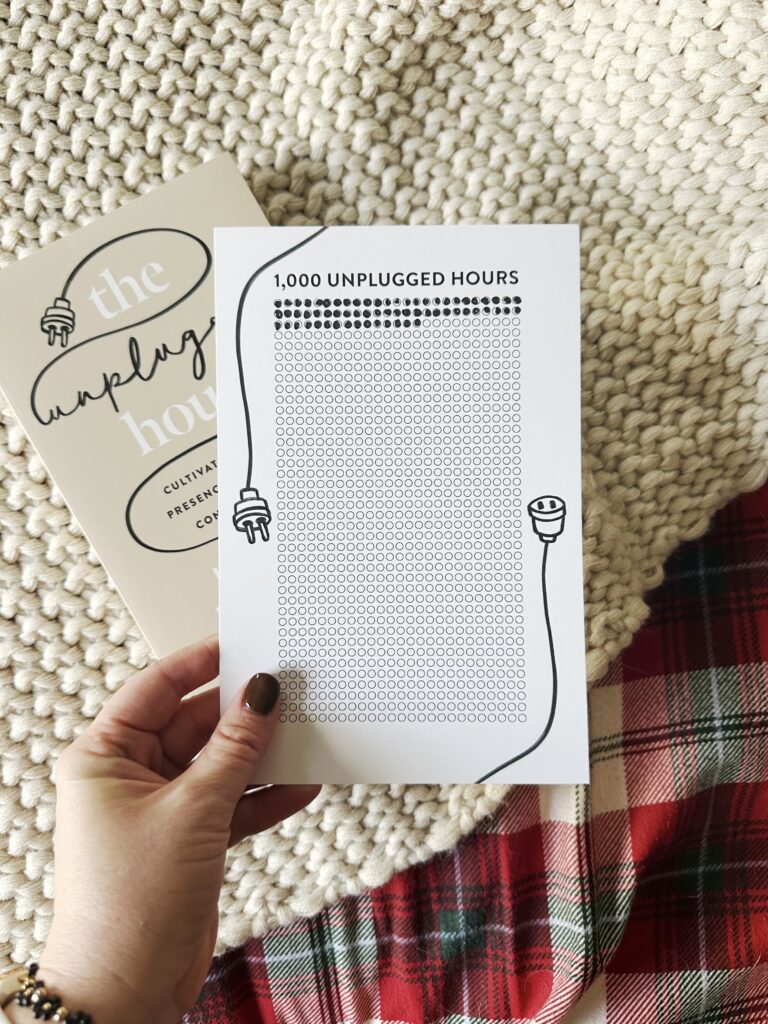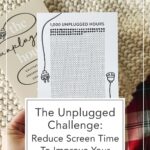
Listen on iTunes | Listen on Spotify | Listen on YouTube | Review the Podcast
Reduce screen time to improve your health, and reclaim your life with these simple unplugging strategies from Hannah Brencher.
Every Sunday brings a moment of alarm. The moment my phone sends a notification of screen time averages for the week. I can’t say I’m surprised. I know I spend more time than I would like on my phone. But the amount is still disturbing.
How Much Time Are You Spending on Your Phone?
Have you ever considered what you could accomplish or genuinely enjoy if you reclaimed that time?
Looking back, I can’t say my screen time ever feels worth it. Most of the time, I can’t even remember what I was doing on my phone fifteen minutes ago, let alone justify the hours I spend scrolling through the week. It’s embarrassing, but I know I’m not alone.
Recent statistics show the average person spends about 4 hours and 37 minutes on their phone daily. And that doesn’t include time spent on computers or watching TV.
Rather than justify it, I’ve decided to take control, inspired by my friend and author Hannah Brencher’s book, The Unplugged Hours: Cultivating a Life of Presence in a Digitally Connected World.
On her 33rd birthday, Hannah realized something had to change. She challenged herself to spend 1,000 unplugged hours over the course of a year. In a recent podcast episode, I interviewed her about this journey—what she learned, what surprised her, and whether she plans to continue.
If you’re ready to rethink your screen habits, give it a listen. It might inspire you to live differently in the year ahead.
Why Unplugging Can Improve Your Health
In my years of exploring the root causes of health issues, one question has always stood out: Why are we so unhealthy, even though we have more health tools than ever?
I can’t say I know all of the answers, but in asking questions and being willing to look outside traditional ‘health and diet’ advice, I’ve found that health is often missed in the disconnection of yourself. I’ve discovered that health often falters when there’s a disconnection between mind, body, and soul.
Traditional health advice tends to compartmentalize life into systems, focusing on what we eat, how much we move, or the balance of hormones. But your body doesn’t operate in isolated parts—it’s an interconnected whole. Everything, from your commute to your conversations, influences your well-being.
Chronic stress or disconnection can keep your nervous system in survival mode, preventing your body from thriving. This explains why you may be doing “all the right things” and still not see any health improvements.
Health isn’t just about food and exercise—it’s also about joy, creativity, and connection. If your lifestyle doesn’t align with your wellness goals, it could be what’s holding you back.
That’s why we need to prioritize creativity, connection, and joy as much as we focus on carbs, protein, and fat. These elements are critical to your health. If your lifestyle doesn’t align with your goals, it could be what’s holding you back.
How To Reduce Screen Time To Improve Your Health
Research increasingly shows that excessive phone use contributes to an unhealthy lifestyle. Blue light disrupts sleep, poor posture causes physical strain, and the constant connection increases loneliness, anxiety, and depression.
All in all, it’s another stress.
Ironically, we often turn to our phones to de-stress, distract, or numb ourselves. But how often does it actually work? If you pay attention, you’ll notice that scrolling drains more energy than it gives. It’s not real rest—it’s another stressor.
While phones aren’t inherently bad—they serve many purposes—we’ve lost balance. The challenge is to find a healthier relationship with our devices. We need to learn how to use them intentionally and know when to set them aside.
How to Reclaim Your Time and Live More Intentionally

So, how do you actually unplug and reclaim your time?
I love Hannah’s approach. As discussed on the podcast and in her book, it isn’t about rigid rules or going cold turkey. Instead, it’s about creating rhythms—replacing screen time with meaningful activities that enrich your life or even engaging in the mundane.
It’s not about perfecting another system but showing up and living intentionally each day. There will be days when you require more screen time and days when you can turn it off completely. The key is to set boundaries and be intentional about when to put your phone down.
Over the past few months (thanks to Hannah’s book), I’ve reduced my own screen time by 50%. While I still have moments of overuse, I feel more intentional overall, and it’s made a noticeable difference.
This applies to our kids as much as it does to us.
I had an ah-ha moment with the harsh reality that I can’t call screen time bad for them and not for myself. Just because I’m older does not grant me immunity to the health concerns of excess screen time. I realized that just as much as they need healthy boundaries, so do I.
5 screentime boundaries I swear by:
- No screens at the table during meals (with the occasional “dinner and a movie” exception).
- No phones or devices in the bathroom (obvious, but worth stating as bathroom time is one of the leading places for mindless scrolling).
- No phones in the front seat of the car (this one is fun, until I’m the passenger).
- No electronics after 8:00 PM (even texting or calls).
- No devices until I start my workday (I’ve learned that everything can wait, and if it can’t, it will get my attention).
Bonus: No phones or devices in the bedroom—a rule my husband and I adopted years ago. It eliminates nighttime scrolling and cuts down on unnecessary distractions.
Take the Unplugged Challenge and Improve Your Well-Being
‘Tis the season for resolution setting and goal-making. While I don’t discourage that, I wonder what could happen over the course of the year if you make a resolution to unplug more often.
Unplugging is a cornerstone habit—a discipline that impacts so many other areas of life. It creates space for creativity, connection, rest, and presence, all of which are essential for health and happiness.
My friend Hannah Brencher has a free download to help you track your unplugged hours. You can learn more about her inspiring challenge and grab the download here.
I think we’d all be amazed at what we could accomplish if we logged off more. For me, unplugging is a key goal for the year ahead, and I’m aiming to hit 1,000 unplugged hours.
Let’s log off and see what we can accomplish when we’re truly present. Listen to my podcast episode with Hannah to hear more about her journey and get inspired to set your own unplugged goals for the year ahead. Make a commitment to reduce screen time to improve your health.
Learn more about Hannah and her books here!
Hannah has been a previous guest on the podcast, diving into her journey with anxiety and depression. You can listen to that episode here. I would highly recommend checking out everything Hannah has to offer, including purchasing all of her books:
Books by Hannah Brencher:
- The Unplugged Hours: Cultivating a Life of Presence in a Digitally Connected World
- Fighting Forward: The Nitty-Gritty Guide to Beating The Lies That Hold You Back
- Come Matter Here: Your Invitation to Be Here in a Getting There World
- If You Find This Letter: My Journey to Find Purpose Through Hundreds of Letters to Strangers
Resources from Hannah Brencher:
